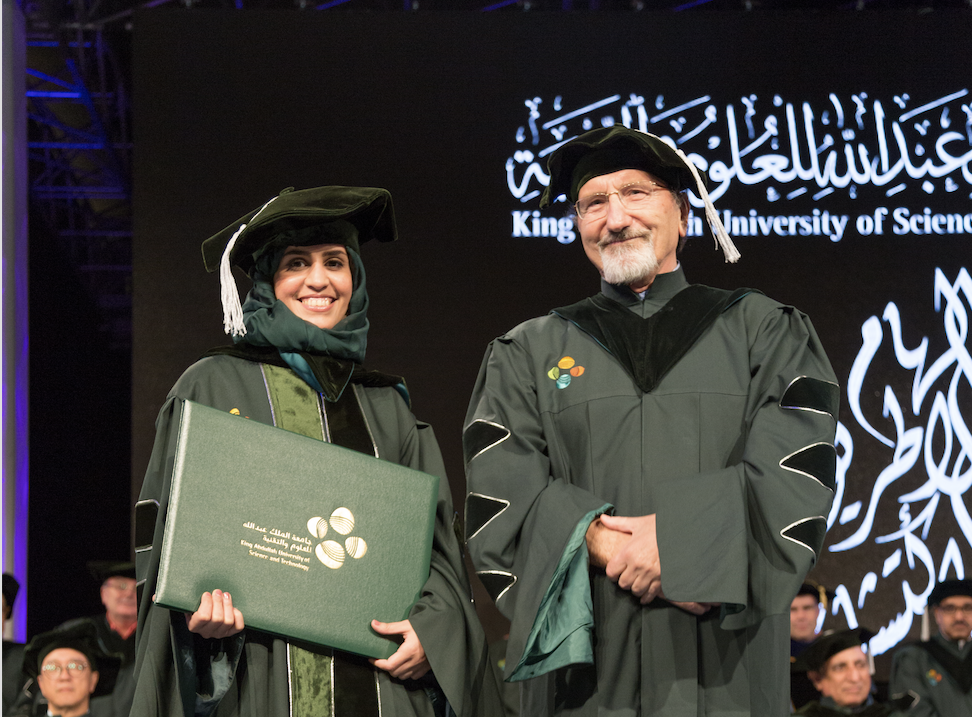Alumni Focus: Haleema A. Alamri - Ph.D. '16

KAUST alumna Haleema Alamri (left) with her PhD supervisor Distinguished Professor Nikos Hadjichristidis. Image courtesy of Haleema Alamri.
Upon graduating from KAUST, alumna Dr. Haleema Alamri joined Saudi Aramco as a research scientist at the Research and Development Center, where she was nominated to join the Ibn Khaldun Fellowship at the Massachusetts Institute of Technology (MIT) as a postdoctoral fellow. She embarked on a new journey, flying to Boston to spend a year working on cutting-edge scientific research in chemistry and polymer science.
"My fellowship at MIT is an amazing opportunity that allows me to do something exceptional. I have incredible access to scientific resources, support and professional networks to pursue my career goals," Alamri said.
The highly competitive Ibn Khaldun Fellowship for Saudi Women is offered to female scientists and engineers from Saudi Arabia who hold doctoral degrees and have demonstrated a high level of achievement. Fellows spend a year doing research at MIT in collaboration with their home organizations and other local universities with the supported of Saudi Aramco.
"Being part of the fellowship cohort gave me the opportunity to build my network of scientific and professional peers as well as a social circle for non-work activities," she said.
During Saudi Crown Prince Mohammed bin Salman's visit to MIT in March 2018, Alamri was nominated to participate as part of the second edition of the Innovation to Impact forum organized by KAUST.
"It was a great opportunity that allowed us to shed some light on how capable we are as Saudi female scientists and to be recognized as a catalyst of change that will help bring Saudi Vision 2030 to life," Alamri noted.
The Saudi Aramco-sponsored Ph.D. alumna graduated from the University's Physical Science and Engineering Division (PSE) at the end of 2016. She conducted her research in the Polymer Synthesis Laboratory at the KAUST Catalysis Center (KCC) under the supervision of her Ph.D. advisor, Distinguished Professor Nikos Hadjichristidis.
Alamri said that KAUST provided an excellent environment where one could "dive freely into the uncharted waters of novel materials research and yet still envision a future direction for their application."
"My journey at KAUST was extremely rewarding and allowed me to get a job at Saudi Aramco and also a one year postdoctoral fellowship at one of the most prestigious universities in the world—MIT," she added.
Alamri believes that doing her Ph.D. at KAUST allowed her to have a solid foundation in chemistry, polymer science and materials science.
"It allowed me to pursue influential research that addresses significant challenges for the Kingdom and the world. My experience at KAUST provided me with an excellent knowledge and training in the synthesis, structure and characterization of polymeric materials, which made me highly proficient in my field," she said.
Ibn Khaldun fellowships exist for the purpose of introducing a new generation of Saudi female scientists to establish leadership role in their fields upon return. The fellowship includes training, mentorships and other networking opportunities to connect Saudi female scientist with professors, scientists, executives and mentors who are all great leaders in their fields.
Alamri's MIT fellowship allows her to regularly attend meetings and events with professors, executives and directors of some of the leading organizations at MIT and Harvard.
"Through these important connections, I am planning to be able to cultivate relationships that can lead to so many great things, including finding a long-term mentor," she added.
For prospective students, Alamri's journey is a demonstration of what young researchers benefit from when joining KAUST.
"Students can receive many benefits from their experiences at KAUST, including the opportunity of acquiring skills and knowledge that supply successful professional training and intellectual growth," Alamri said.
Related stories:
- Extending collaboration at 2018 Innovation to Impact Forum
- Alumni Focus: Joanna Nassar
- Alumni Focus: Klemens Katterbauer - Ph.D. '15 in Earth Science and Engineering
- A student's journey from KAUST to Stanford
- Sharing memories at 2016 Alumni Reunion Weekend
- Graduate's patent-pending technology highlighted by North American Membrane Society

